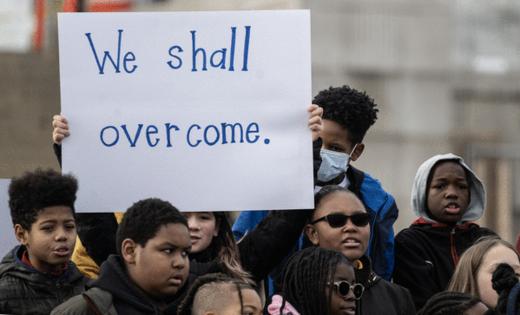Commentary: My father told America, 'I have a dream.' Today, the dream needs us
Published in Op Eds
On Aug. 28, 1963, my father stood on the steps of the Lincoln Memorial and summoned a nation to listen — not merely to a speech, but to a vision. He dreamed out loud, daring America to imagine itself better: a country where dignity wasn’t determined by skin color, where opportunity wasn’t bound by birth and where the promises of democracy were extended to all. That dream ignited a movement, moved hearts and bent the arc of history toward justice.
Sixty-two years later, I walk in the long shadow of that day — with pride, yes, but also with profound concern. For while we have marched many miles toward freedom, we find ourselves, yet again, in a moment of moral reckoning.
Today, I ask not only: What is the state of the dream? But also, more urgently: Will we continue to pursue it, or will we let it slip away?
The March on Washington was never solely about ending segregation. It was also a call for economic justice, for access to good jobs, fair housing, decent education and, above all, the right to vote. It was a demand not just for civil rights but also for human dignity.
In the following years, we won landmark victories — the Civil Rights Act of 1964, the Voting Rights Act of 1965 and the Fair Housing Act of 1968. They didn’t solve every problem, but they provided the tools to build a more just society. And for a time, it seemed we were climbing toward the mountaintop.
But history, as my father often warned, doesn’t move forward on its own. The forces of injustice never sleep, and today we find ourselves confronting a dangerous regression.
Earlier this month, the Voting Rights Act turned 60. But instead of celebrating its strength, we are mourning its erosion. Since the Supreme Court’s Shelby County vs. Holder decision, at least 29 states have passed 94 restrictive voting laws — laws designed not to secure democracy, but to suppress it. Gerrymandering, voter roll purges, closed polling stations and harsh ID requirements— all one purpose: a concerted effort to weaken the voice of the people.
These assaults on the vote do not stand alone. They exist alongside deepening economic inequality that continues to choke opportunity, especially for communities of color. In 2024, the wealth of 19 of the richest American households soared by $1 trillion. Nearly 1 in 3 Americans reported a worsening financial situation — and almost half of Black Americans struggle with healthcare costs. The racial wealth gap is growing. Black families hold just $15 for every $100 white families have.
These aren’t just statistics. These are the symptoms of a system still rigged against the people my father fought for. They reflect the “other America,” where poverty, prejudice and despair remain the norm.
These disparities grew worse during the COVID-19 pandemic, when Black Americans died at twice the rate of white people. Not due to biology, but to injustice — because of unequal access to care, jobs and protection.
This is not the dream. This is the nightmare my father warned us against.
Our divisions are being weaponized. Hatred, fear and bigotry are no longer whispered in the shadows. They are shouted from podiums, spread across airwaves and codified in policies.
And yet, I do not despair.
I still believe in the dream — not as a distant hope, but as a call to action. My wife, Arndrea, and I, along with our daughter, Yolanda, work daily to honor my father’s legacy and build the “Beloved Community”: a nation rooted in justice, compassion and solidarity. The dream cannot thrive where votes are silenced, wealth determines worth and people are punished for simply seeking to live in dignity.
On Thursday, we’ll march again — this time on Wall Street, alongside a coalition of leaders and activists — to demand economic justice for all. True freedom is not possible without the freedom to thrive. We march not just for 1963, but for 2025 and beyond.
The power of that day 62 years ago was not in its pageantry, but in its purpose. The 250,000 people who gathered on the National Mall didn’t come for a celebration — they came to issue a challenge: America, live up to your ideals.
That challenge remains.
Anniversaries are not just markers of time. They are invitations to recommit. They remind us the work of justice is never finished, and each generation must embrace the mantle anew.
So, let us move from memory to movement. Let us not simply admire the dream but advance it. Let us protect the vote, close the wealth gap, invest in our communities and raise our voices until justice rolls down like waters and righteousness like a mighty stream.
The dream is still alive — but only if we fight for it.
Let us march forward together.
____
Martin Luther King III is a global humanitarian and activist and the eldest son of the Rev. Martin Luther King Jr. He is chairman of the board of the Drum Major Institute, co-author of “ What Is My Legacy?” and co-host of the “ My Legacy” podcast.
©2025 Los Angeles Times. Visit at latimes.com. Distributed by Tribune Content Agency, LLC.
























































Comments